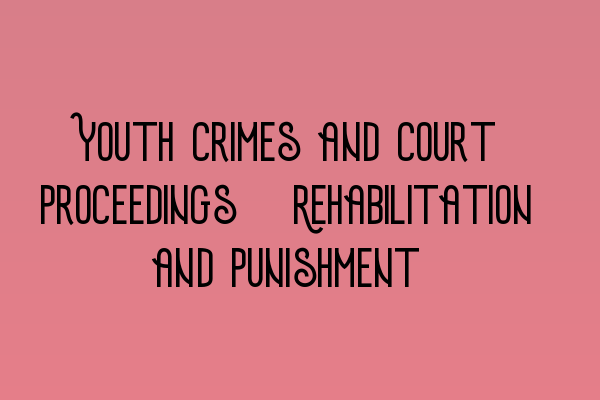Youth Crimes and Court Proceedings: Rehabilitation and Punishment
Introduction:
In today’s blog post, we will be discussing a critical topic in criminal law: youth crimes and court proceedings. The treatment and rehabilitation of young offenders are essential factors to consider when dealing with criminal offenses committed by minors. This article aims to provide an in-depth analysis of the judicial system’s approach towards juvenile offenders in the UK, emphasizing the importance of rehabilitation alongside punishment.
Relevant Keywords: Youth crimes, court proceedings, rehabilitation, punishment, juvenile offenders
Understanding the Legal Framework:
The criminal justice system in the UK recognizes that young offenders have unique needs and vulnerabilities that require a different approach than adult offenders. The main legislation governing the treatment of youth crimes is the Children and Young Persons Act 1933, which sets out the principles and procedures for dealing with young offenders. This Act enshrines the key principle of rehabilitation as the primary aim, recognizing the potential for positive change in young individuals.
Relevant Keywords: Children and Young Persons Act 1933, young offenders, rehabilitation, legal framework
Rehabilitation vs. Punishment:
Rehabilitation is at the forefront of the UK’s approach to dealing with youth crimes. The emphasis is on addressing the underlying issues that contribute to a young person’s criminal behavior and providing them with the necessary support and guidance to reintegrate into society as law-abiding citizens. By focusing on rehabilitation, the criminal justice system aims to break the cycle of criminality and prevent further offenses in the future.
However, it is important to note that punishment is also a component of the judicial process for young offenders. Punishment serves as a deterrent and sends a signal that certain behaviors are unacceptable. Nevertheless, it should be proportionate, taking into account the offender’s age, level of maturity, and individual circumstances.
Relevant Keywords: Rehabilitation, punishment, young offenders, criminal behavior, deterrent
Youth Court Proceedings:
When a young person is accused of a crime, the case is generally heard in a youth court, which is a specialized court for individuals under the age of 18. The youth court aims to provide a less formal and intimidating environment than adult courts, recognizing the need to safeguard the best interests of the child. The court proceedings in youth cases are generally closed to the public, ensuring the privacy and welfare of the young person involved.
Relevant Keywords: Youth court, young offenders, court proceedings, privacy, welfare
Rehabilitative Measures:
In addition to court proceedings, various rehabilitative measures are put in place to address the needs of young offenders. These measures include community sentences, probation, and youth offender panels. Community sentences allow young individuals to serve their sentences within the community while receiving support and guidance from probation officers. Probation plays a crucial role in helping young offenders reintegrate and avoid reoffending through supervision and intervention programs. Youth offender panels provide an opportunity for young offenders to meet and engage with their victims, facilitating accountability and an understanding of the consequences of their actions.
Relevant Keywords: Community sentences, probation, youth offender panels, rehabilitative measures
Conclusion:
In conclusion, the treatment of youth crimes and court proceedings in the UK involves a delicate balance between rehabilitation and punishment. It is essential to recognize the potential for positive change in young individuals and provide them with the necessary support and guidance to reintegrate into society. By employing rehabilitative measures alongside appropriate punishment, the criminal justice system aims to break the cycle of criminality and promote the long-term welfare of young offenders.
Related Articles:
– Enhancing Your SQE Criminal Law Study Group Experience
– Decoding Criminal Evidence Rules: A Detailed Analysis
– Public Prosecutions in the UK: A Closer Look at State Prosecution
– Inside Look: Uncovering UK Police Procedures in Criminal Cases
– Gathering Crucial Evidence in Criminal Cases: Methods and Techniques
